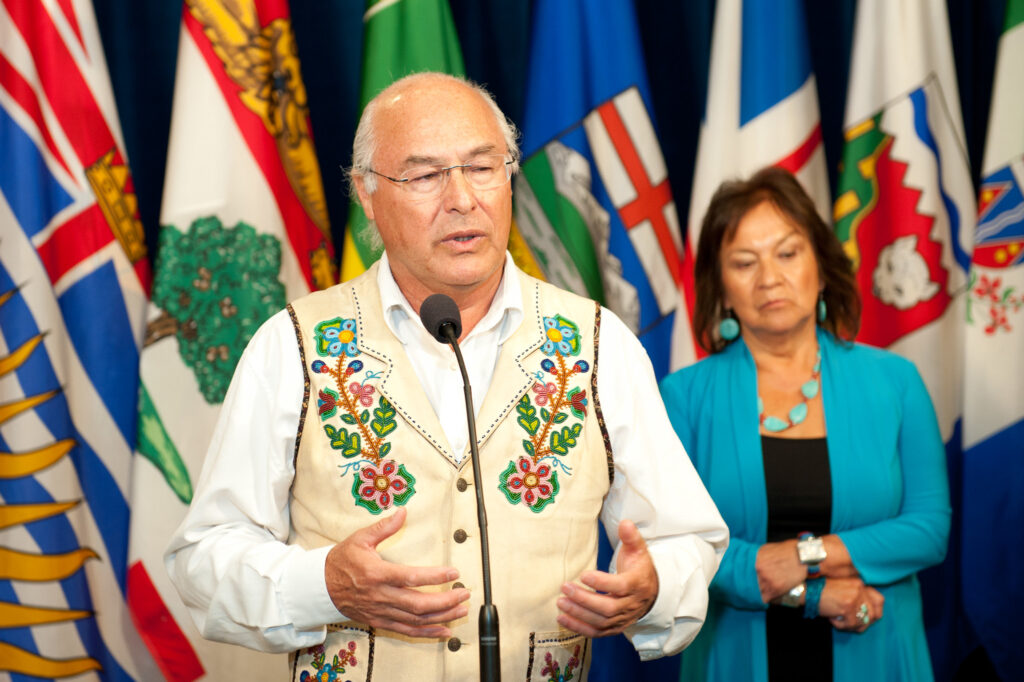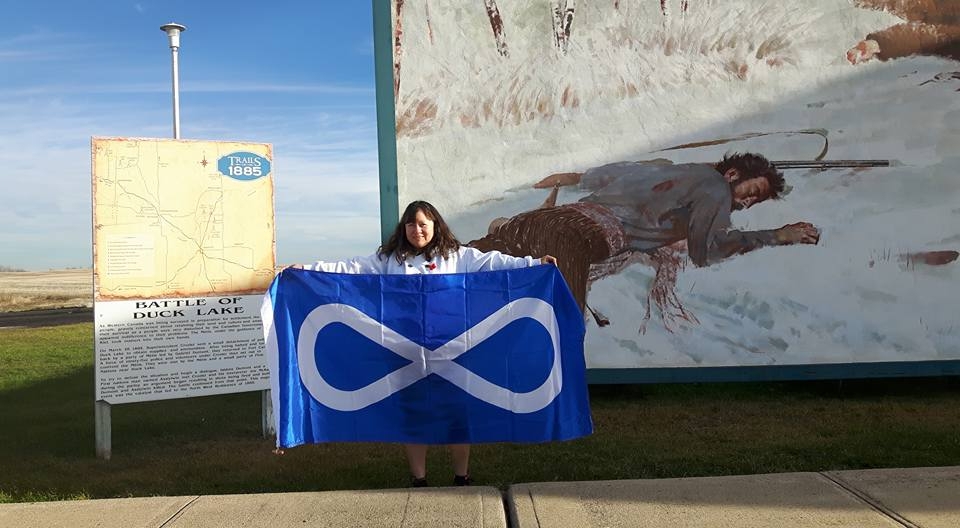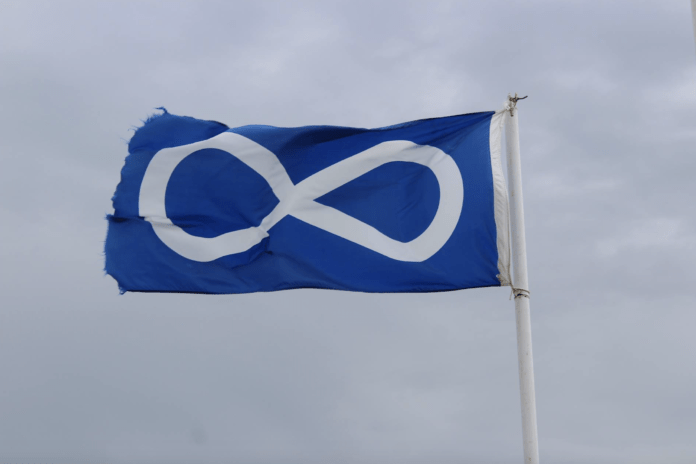Métis citizens of Saskatchewan head to the polls on Saturday in an election that will shape the direction of their governance system, citizenship, approach to land-claims and consultation policies with industry.
For the last four years under president Glen McCallum’s leadership, the Métis Nation of Saskatchewan (MN-S) has moved on all of those issues after signing agreements with the federal and provincial governments.
The four-way race for the MN-S presidency pits McCallum as the incumbent against Métis National Council (MNC) President Clément Chartier, Mary Ann Morin and Karen LaRocque.
“I believe the majority of our people have been excited about where the Métis nation is going and we have to continue building it,” McCallum told the Daily Herald.
“They should at this time exercise their right as voters to be able to go to the ballot box and choose who their leaders are going to be. And I hope they do.”
McCallum said if given a mandate for the next four years his first priorities would be to reform the Métis judicial system and work to negotiate land claims in the northwest. He intends to finalize a province-wide agreement on the duty to consult with the Métis on resource development.
He wants to focus on building “strong and reliable” healthcare and wellness systems while expanding culture and language programs now that the MN-S is in a better position. That position, he says, is thanks to more federal dollars negotiated through section 35 of the Constitution Act that affirms Aboriginal rights.

Voters 16 years of age or older who have lived in the province for six months and hold Métis citizenship cards can vote at designated polling stations across Saskatchewan.
This year the voting process itself, in particular the requirement that voters be registered as Métis with the MN-S, is central to election debates.
McCallum says citizenship cards are important to make sure that everyone who votes is in fact Métis.
Chartier and Morin argue the Métis locals (local governments spread across the province), who have long decided who votes, should continue to be permitted to do so. In previous elections Métis would sign a declaration before voting and access services by way of community consensus.
February’s Métis National Legislative Assembly (MNLA) passed amendments to the Saskatchewan Métis Elections Act and the MN-S Citizenship Act making the cards a requirement . Those who can prove that they’ve applied for citizenship before March 20 are also allowed to vote. Chartier challenged the amendments at the provincial Court of Queen’s Bench, but the court upheld them.
“They’ve dispossessed so far hundreds of people that have wished to vote and can’t vote in this election — which is truly a crime against our people — stripping them of their democratic rights,” Chartier said.
“Their new policy over the past two years is if you don’t have a card, you don’t get services. During COVID I’m told there are people that couldn’t get any help because they didn’t have a card. This is totally, totally wrong.”

Chartier said he’s planning to establish a Métis land commission — which will deal with the rights of the Métis throughout the province.
“We still have existing Aboriginal title to the lands and resources throughout the province. I’m going to work toward a settlement of that — particularly if the Liberal government gets another term in office — the door is open for us,” Chartier said.
“I will work toward establishing Métis rights to land throughout the whole province. For northwest Saskatchewan I am going to press to get the table that was committed to us… To set up an exploratory discussion table with the Northwest Saskatchewan Métis Council.”
Chartier also takes issue with an MN-S lawsuit against the province of Saskatchewan filed last fall over its 2010 Consultation Policy Framework for the duty to consult on development projects — which the MN-S contends doesn’t properly recognize Métis title to the land.
“MN-S has taken the position that the duty to consult is not owed to the community… that it is owed to them. And they in fact, have taken the province to court last fall, saying that the 2010 Consultation Policy is wrong. That it’s not owed to the community, but it’s owed to the MN-S,” Chartier said.
“And so that’s totally wrong in law, I mean, provincial policy is correct. But MN-S is trying to consolidate everything into the head office and deprive the local community of their section 35 rights.”
Chartier contends the MN-S is being “underhanded” by requiring that citizens designate the Métis government to negotiate section 35 rights on their behalf.
“There are many that refuse to apply because they don’t want to give their rights away to the MN-S. Others — because they want the cards — have signed up. So, it’s not voluntary. If you want a card, you have to sign and there is no choice,” Chartier said.
“So that, to me, is an underhanded way of having people sign away their section 35 rights and duty to consult responsibilities.”
Chartier lambasted the current relationship between MN-S and the province.
“ I understand it really hasn’t been a good working relationship between the provincial government and the MN-S over the past four years. I do know the premier, I’ve met with him several times, and I would start opening those doors to start engaging,” Chartier said.
“I would begin making inroads with the provincial government.”
Chartier also plans to bring the MN-S back into the fold with the MNC. He accused McCallum of not supporting his move as president of the MNC to exclude the Métis Nation of Ontario (MNO).
He said McCallum and the MN-S aren’t following what’s called a “distinction-based policy approach.”
Chartier contends that continuing to work with the MNO will open the floodgates to non-Métis who are of mixed ancestry claiming citizenship.
Distinctions-based means the three federally recognized Indigenous groupings in Canada: First Nations, Métis, and Inuit. The distinctions-based approach was intended to remedy the previous “pan-Aboriginal” or “one size fits all” approach to Indigenous policy and decision-making.
“What’s important to me may not be important to other people, because a lot of people are still looking at bread and butter issues. I’m looking at, in my mind, two major things,” Chartier said.
“One is, under our move towards self-government, we need to ensure that we negotiate modern land claim agreements, and programs and services flow with that. And the next one is preserving the integrity of the historic Métis nation, homeland, citizenship, and identity.”
Chartier said those issues need to be resolved while the federal liberals are in power in case a conservative government has a different outlook.
“Our democracy is at stake. Our right to existence as a people is at stake and our opportunity to secure our land rights and self-government could be fleeting. It’s only there as long as the Liberal government stays in power.”
McCallum responded to Chartier’s comments saying he’s being misrepresented. He said that if Chartier wants to ensure that members of the MNC are real Métis, he should feel the same way about citizenship requirements for Métis in Saskatchewan.
Streamlining the MN-S as a functioning government is part of what distinction-based policy means, he said. He said Canada and the province need to take the MN-S more seriously as a partner government. For that to happen, the MN-S needs to prove that it can function on that level and represent the Métis people.
“I’m so proud of the registry in regard to what we’ve done in a very short period of time where 18,400 people have registered so far. That’s beautiful to see because the spirit of our people is awake — they’re awake, and they’re interested in what’s going on,” McCallum said.
“The days of ballot stuffing, the days of declaration forms where you don’t even know who’s voting, those days are gone. It’s very clear in regard to who the Métis are and what we use to define ourselves — but more importantly, registering and having their Métis cards. I love that.
“We have a system in place that’s very well set up and we can guarantee that it’s transparent and at the same time very specific in regard to who is Métis. That’s what we’ve been missing all these years. So, when people talk about difficulties, yes, it would have been difficult if we still voted in questionable elections. That always happened in the past years. That will not happen anymore because legitimate Métis people are voting — because they hold the citizenship card.”
McCallum said the relationship with the province boils down to mutual trust and respect. He said that governments are working better with the MN-S now that it acts as a government body.
“It’s not a bad relationship. It’s just a matter of trust. If you are the premier… after 25 years of MN-S sitting in limbo — with all the infighting that was going on… you’re never knowing what’s going to happen,” McCallum said.
“That’s why that relationship (with the province) is developing — it’s not going to happen overnight. In four years, we’ve developed a true partnership with the federal government, and we have proven to other institutions and industry (that they can work with us).”
In regard to the duty to consult, McCallum wants a government-to-government relationship with the province rather than having companies negotiate separately with the Métis locals.
“We’re responsible to our own government as a Métis government here in Saskatchewan to be able to develop a process to negotiate or to be able to work with as far as duty to consult and accommodate. That’s our job to do. People expect that of us,” McCallum said.
“The province hasn’t negotiated with us or communicated with us about what we need as a Métis nation. It’s only been the last four years that we’ve actually started discussing the importance of engagement with Métis people.
“We’ve done quite a bit of engagement with our people until COVID hit and we kind of slowed down. It’s not an excuse, it’s just a matter of fact, in regard to what has happened. We continue to nurture along communications. We look forward to next term — if the people feel confident in me — those engagements will happen.”
Morin wants a decentralized Métis government and called the MN-S format “colonial.”

“I want to see the people’s vision be our vision. I believe that in the past four years, they’ve forgotten that the citizens are the rights holders of their communities. This past government has been all focused on centralization and more of a dictatorship style,” Morin said.
“When you look at the MNLA, it’s kind of colonial judgment style setup, versus a collective that is able to speak out instead of being told to speak. I have found that when people question decisions or motions people are not able to get the answers.”
She said that if MN-S is currently negotiating on behalf of each of the Métis locals, there’s been no reporting back to the communities on their behalf, nor have the locals given their authority to the Métis Nation of Saskatchewan to do that.
“They’ve kind of overstepped their boundaries,” Morin said.
“We’re just a layer of administration lobbying the government for more support, representing the citizens and the locals. Our role is to ensure the locals have the resources they need to be able to negotiate their own contracts. We don’t need to be there. Because really, we only sit there, and lawyers negotiate. So, try and get the best lawyer you can in the best interest of the Métis citizens.
“My direction is to decentralize. I grew up in a decentralized, Métis organization in the 80s. We had sports, we had land-based training, we had so much pride in being Métis, and we’ve lost that at our community level… So, I think we have to go back to the basics, and we have to go back to the people. I truly believe that people are the ones who make decisions, we just help support those decisions, whichever way we can.”
McCallum said he’s not a “dictator” and that he follows the democratic process at the Métis government. He said the locals are an essential part of the MN-S — forming the grassroots of the decision-making process.
“I only have one vote for me at the Provincial Métis Council table, and I have one vote at the legislative assembly,” McCallum said.
“We have to discuss things and when we make a resolution, it’s not Glen McCallum that decides — it’s our body of government, our legislative assembly and our legislators that made that decision.”
McCallum conceded the pandemic has slowed things down but asks voters to put their faith in him again on Saturday.
“Because of all the things that were going on, we weren’t able to address everything,” McCallum said.
“So, there’s a lot of work to be done. But there’s a lot of work that has been done. I believe if I can get in and if the people so believe that we need to keep going forward on what we’ve built — it will give us an opportunity to be able to finish off some of the things that are still being nurtured along.”
The Herald reached out to Karen LaRocque but she did not respond by press time.


